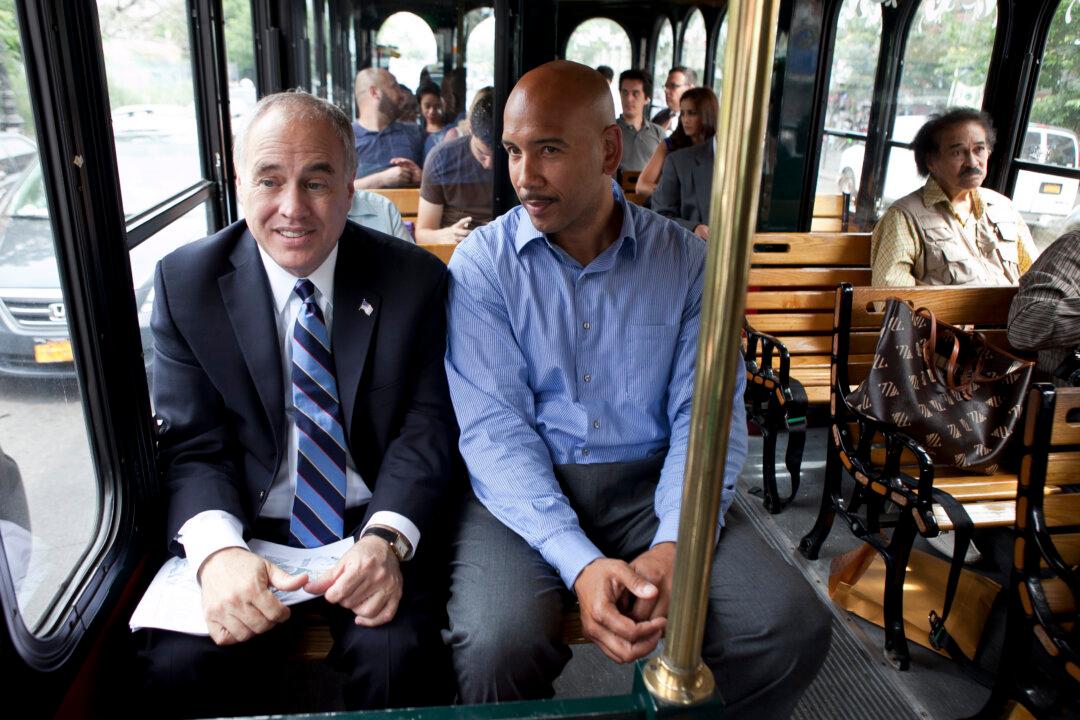NEW YORK—A sludge fertilizer plant in Hunts Point in the South Bronx once filled the air with its stench. Nearby, trash was piled on the shore in a massive illegal garbage dump tied to the mob. An empty factory loomed on the other side of the polluted bay.
In the last three years, however, the NYOFCo sludge fertilizer plant was closed and its gunk was buried, the shoreline once covered in garbage is now home to the Jetro food distribution center, and the abandoned factory is now the location of The BankNote incubator with offices to attract tech startups.
An economic snapshot released by the state comptroller on July 11 shows that since 1990, crime in the Bronx dropped by 75 percent, the number of businesses increased by 25 percent, and the average private sector salary of $43,610 beats Brooklyn and Staten Island.
Bronx Borough President Ruben Diaz Jr. sat on a wooden seat in a trolley of the Bronx Tourism Center as it rolled through Hunts Point on July 11. In the aftermath of the now defunct Bronx “ghetto” tours, and in light of the new economic snapshot, he helped organize a tour showing what he’s calling the “New Bronx.”
“The Bronx has had its tough days, but those tough days are now behind us,” Diaz Jr. said during a press conference just prior to the tour, at the Bronx Federal Courthouse.
“We want the world to know that we are a new Bronx,” he said.
The “New Bronx” isn’t just a slogan, but it may be more fitting to say the Bronx is on the cusp of change.
The trolley drove down East 149th Street, near Bergen Avenue. The area is one of the infamous “food deserts,” yet soon this will be different, as a large supermarket is set to be built there.
In a nearby field, a “Coming Soon” sign with an artist’s rendering of a fancy new shopping center hangs over an empty lot. Across the street, in the building of the former Bronx Opera House, a luxury hotel is getting ready to open its doors.
Near the now-closed Bronx Borough Courthouse are the Orion Condos, some of the numerous middle-income housing developments the borough is trying to create.
Development now happening in the Bronx is planned around some of the key problems the borough is facing: skilled workers often leave the borough, or don’t come in the first place. And because of the scarred image of the Bronx, the borough is often left out of economic initiatives in other parts of the city—particularly tourism, the growing tech sector, and the film industry.
Getting the Bronx on track requires attracting people to settle down—where people feel safe, can have good homes, and have good education for their children—and the developments now happening in the Bronx have these factors at heart.
“Then we retain them. If not, what you get is that cycle,” Diaz said. He added that when it comes to the middle class, “a lot of them make too much money for affordable housing, but not enough to buy their own homes.”
Yet, Diaz isn’t trying to butter things up. In 2011, the Bronx still had more people below the federal poverty level of any urban county in the nation at 30 percent.
He said this ties to the difficult history of the Bronx, particularly the arson fires of the 1960s and ’70s that left large swathes of the borough in ruins.
“We’ve been beaten down. We were practically left for dead,” he said. “What I would say to those people is we’ve weathered the storm. The worst is behind us.”





